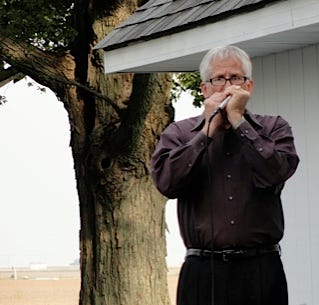Timber! Dallas 'jingle king' gets paid
How the hit single by Pitbull and Ke$ha opened royalties for session players
I used to be a music awards junkie: Grammys, MTV Awards, CMAs, ACMs, Soul Train- I watched them all- even when it wasn’t my job any more. At the American Music Awards in October 2013 I was completely blown away by this show-stealing (lip-synced) performance of “Timber,” on its way to the top of the charts. It was that harmonica that really hooked me with a “bluestronica” sound also explored by Alabama 3’s “Sopranos” theme song. I posted about “Timber” on facebook, and among the comments about how the song was trash, received a bit of interesting info from the great musician Homer Henderson (who passed away this year). He was friends with the harp player, Paul Harrington, one of the best in Texas. They’d been in a band together, but lately Harrington made most of his money playing on jingles. Homer gave me Harrington’s number in Rockwall, a suburb of Dallas, and I wrote this for the Dallas Morning News web site.
As a harmonica player on jingles for the past 30 years in Dallas, Paul Harrington is used to these kind of gigs. Blow your harp for an hour and a half and leave with a check. So when jingle producer Nick Seeley set up a session at his home studio near Walnut Hill Lane and N. Central Expressway, Harrington took to the assignment like any other job. And now he’s the lead instrumentalist on the year’s hottest single.
If you’ve heard “Timber,” the catchy new single by Pitbull and Ke$ha, you’ve heard Harrington. That’s his harmonica that kicks off the song and weaves through the rhythm for the entire 3:24. “It may sound like a loop, but I played that live throughout the track,” says the leader of the Paul Harrington Band, whose blues are rarely played where food isn’t served.
Since “Timber” interpolates “San Francisco Bay” by former War harmonica player Lee Oskar, the only instruction Harrington received through Seeley from producers Dr. Luke, Cirkut and Sermstyle, was to make it sound like Oskar. Harrington played to a spare backing track, with just the beat and a synthesizer playing the chord changes. It took him about 90 minutes to nail it.
“When I heard the finished track, I was knocked out,” said Harrington. “Boy, did they turn me up loud.” Harrington received a flat fee of $1,000 for the session. No royalties.
A native of Illinois who was greatly influenced by Paul Butterfield, Charlie McCoy and Stevie Wonder growing up, Harrington played in various bar bands in Aspen, Colo. for several years before moving to the Metroplex in 1983. “Dallas was the jingle capital of the country when I moved here,” he said. His harmonica has been heard on hundreds of radio and TV spots, including Chevy Trucks and McDonald’s.
As for how “Timber”’s producers found out about him, he has no idea. “It was just another session and I did my best,” Harrington said.
*****
After this story ran, and “Timber” sold over 10 million copies worldwide, Harrington’s bassist Eric Zukowski put on his entertainment lawyer cap to see if the lead instrumentalist on the track deserved more than a work-for-hire flat fee. That's when Zukoski discovered the Digital Performance Right in Sound Recordings Act of 1996, which allows studio musicians to receive royalties for songs played over the internet. With BMI’s help, Harrington eventually received a check from Sony Music Entertainment (which owns RCA) for $50,000 and change for back royalties. He continues to receive yearly checks for the track which has been used in all sorts of commercials and at sporting events. It’s good to have a lawyer in the band.
Another revenue stream for the humble harp veteran is YouTube, where the official video for “Timber” has attracted nearly 1.4 billion viewers.
In 2020, Zukowski, representing Austin trombonist Jon Blondell and other musicians, won a $46 million class action suit against the SAG-AFTRA Intellectual Property Rights Distribution Fund. A new law requires 5% of a recording’s royalties to go to the session players, which isn’t much, but it’s something.
Blondell played trombone on the seven-million-selling Sublime album, produced at Willie’s Pedernales studio by Paul Leary of the Butthole Surfers. His trombone solo, which interpolates “Rhapsody In Blue” comes in at the 1:30 minute mark of this cheesy video.
I feel like I played a little part in 60,000 session musicians receiving checks, for a story that I never got paid for. The DMN’s administrative red tape for a first-time freelancer was worse than the DMV- not really worth the $100, so I just told my friend Robert Wilonsky, then-editor of dallasmorningnews.com, to buy me dinner. I bring it up whenever the check comes.




I love you give a shout out to Homer Henderson. He has a song " Lee Harvey Oswald was a friend of mine. Every work is true! All the other Texas musicians you mention ( Paul the god of trombone). So grateful you got royalties for session players. Doing Gods work as far as I am concerned. Now I gotta listen to Timber. I am also a working Texas bar band musician. I love to read Ke$ha and Homer Henderson in the same piece. Homer was a hero to me.
Group Seven Productions (and its Studio Seven) in Dallas were where almost all of the jingles were recorded back in the day. They were huge.